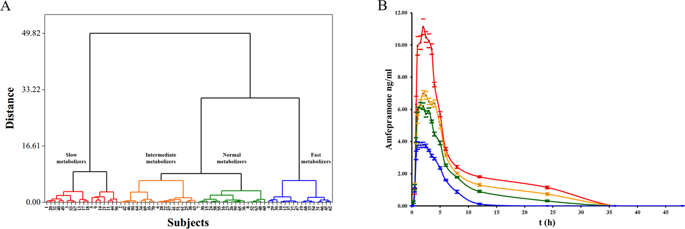Our official English website, www.x-mol.net, welcomes your
feedback! (Note: you will need to create a separate account there.)
Pharmacogenetics of amfepramone in healthy Mexican subjects reveals potential markers for tailoring pharmacotherapy of obesity: results of a randomised trial.
Scientific Reports ( IF 3.8 ) Pub Date : 2019-11-28 , DOI: 10.1038/s41598-019-54436-z Magdalena Gómez-Silva 1, 2 , Everardo Piñeyro-Garza 3 , Rigoberto Vargas-Zapata 4 , María Elena Gamino-Peña 5 , Armando León-García 6 , Mario Bermúdez de León 7 , Adrián Llerena 8 , Rafael B R León-Cachón 9
Scientific Reports ( IF 3.8 ) Pub Date : 2019-11-28 , DOI: 10.1038/s41598-019-54436-z Magdalena Gómez-Silva 1, 2 , Everardo Piñeyro-Garza 3 , Rigoberto Vargas-Zapata 4 , María Elena Gamino-Peña 5 , Armando León-García 6 , Mario Bermúdez de León 7 , Adrián Llerena 8 , Rafael B R León-Cachón 9
Affiliation

|
Amfepramone (AFP) is an appetite-suppressant drug used in the treatment of obesity. Nonetheless, studies on interindividual pharmacokinetic variability and its association with genetic variants are limited. We employed a pharmacokinetic and pharmacogenetic approach to determine possible metabolic phenotypes of AFP and identify genetic markers that could affect the pharmacokinetic variability in a Mexican population. A controlled, randomized, crossover, single-blind, two-treatment, two-period, and two sequence clinical study of AFP (a single 75 mg dose) was conducted in 36 healthy Mexican volunteers who fulfilled the study requirements. Amfepramone plasma levels were measured using high-performance liquid chromatography mass spectrometry. Genotyping was performed using real-time PCR with TaqMan probes. Four AFP metabolizer phenotypes were found in our population: slow, normal, intermediate, and fast. Additionally, two gene polymorphisms, ABCB1-rs1045642 and CYP3A4-rs2242480, had a significant effect on AFP pharmacokinetics (P < 0.05) and were the predictor factors in a log-linear regression model. The ABCB1 and CYP3A4 gene polymorphisms were associated with a fast metabolizer phenotype. These results suggest that metabolism of AFP in the Mexican population is variable. In addition, the genetic variants ABCB1-rs1045642 and CYP3A4-rs2242480 may partially explain the AFP pharmacokinetic variability.
中文翻译:

在健康的墨西哥受试者中,安非拉酮的药物遗传学研究揭示了针对肥胖症进行药物治疗的潜在标志物:一项随机试验的结果。
安非拉酮(AFP)是一种用于治疗肥胖症的食欲抑制剂。但是,关于个体间药代动力学变异性及其与遗传变异的关系的研究是有限的。我们采用了药代动力学和药物遗传学方法来确定AFP可能的代谢表型,并确定可能影响墨西哥人群药代动力学变异性的遗传标记。在满足研究要求的36名健康墨西哥志愿者中进行了AFP(单次75 mg剂量)的对照,随机,交叉,单盲,两次治疗,两次治疗和两种序列的AFP临床研究。使用高效液相色谱质谱法测量安非拉酮血浆水平。使用带有TaqMan探针的实时PCR进行基因分型。在我们的人群中发现了四种AFP代谢物表型:慢速,正常,中等和快速。此外,ABCB1-rs1045642和CYP3A4-rs2242480这两个基因多态性对AFP药代动力学有显着影响(P <0.05),并且是对数线性回归模型的预测因素。ABCB1和CYP3A4基因多态性与快速代谢者表型有关。这些结果表明墨西哥人口中AFP的代谢是可变的。此外,遗传变异ABCB1-rs1045642和CYP3A4-rs2242480可能部分解释了AFP药代动力学的变异性。05)和是对数线性回归模型中的预测因素。ABCB1和CYP3A4基因多态性与快速代谢者表型有关。这些结果表明墨西哥人口中AFP的代谢是可变的。此外,遗传变异ABCB1-rs1045642和CYP3A4-rs2242480可能部分解释了AFP药代动力学的变异性。05)和是对数线性回归模型中的预测因素。ABCB1和CYP3A4基因多态性与快速代谢者表型有关。这些结果表明墨西哥人口中AFP的代谢是可变的。此外,遗传变异ABCB1-rs1045642和CYP3A4-rs2242480可能部分解释了AFP药代动力学的变异性。
更新日期:2019-11-29
中文翻译:

在健康的墨西哥受试者中,安非拉酮的药物遗传学研究揭示了针对肥胖症进行药物治疗的潜在标志物:一项随机试验的结果。
安非拉酮(AFP)是一种用于治疗肥胖症的食欲抑制剂。但是,关于个体间药代动力学变异性及其与遗传变异的关系的研究是有限的。我们采用了药代动力学和药物遗传学方法来确定AFP可能的代谢表型,并确定可能影响墨西哥人群药代动力学变异性的遗传标记。在满足研究要求的36名健康墨西哥志愿者中进行了AFP(单次75 mg剂量)的对照,随机,交叉,单盲,两次治疗,两次治疗和两种序列的AFP临床研究。使用高效液相色谱质谱法测量安非拉酮血浆水平。使用带有TaqMan探针的实时PCR进行基因分型。在我们的人群中发现了四种AFP代谢物表型:慢速,正常,中等和快速。此外,ABCB1-rs1045642和CYP3A4-rs2242480这两个基因多态性对AFP药代动力学有显着影响(P <0.05),并且是对数线性回归模型的预测因素。ABCB1和CYP3A4基因多态性与快速代谢者表型有关。这些结果表明墨西哥人口中AFP的代谢是可变的。此外,遗传变异ABCB1-rs1045642和CYP3A4-rs2242480可能部分解释了AFP药代动力学的变异性。05)和是对数线性回归模型中的预测因素。ABCB1和CYP3A4基因多态性与快速代谢者表型有关。这些结果表明墨西哥人口中AFP的代谢是可变的。此外,遗传变异ABCB1-rs1045642和CYP3A4-rs2242480可能部分解释了AFP药代动力学的变异性。05)和是对数线性回归模型中的预测因素。ABCB1和CYP3A4基因多态性与快速代谢者表型有关。这些结果表明墨西哥人口中AFP的代谢是可变的。此外,遗传变异ABCB1-rs1045642和CYP3A4-rs2242480可能部分解释了AFP药代动力学的变异性。































 京公网安备 11010802027423号
京公网安备 11010802027423号